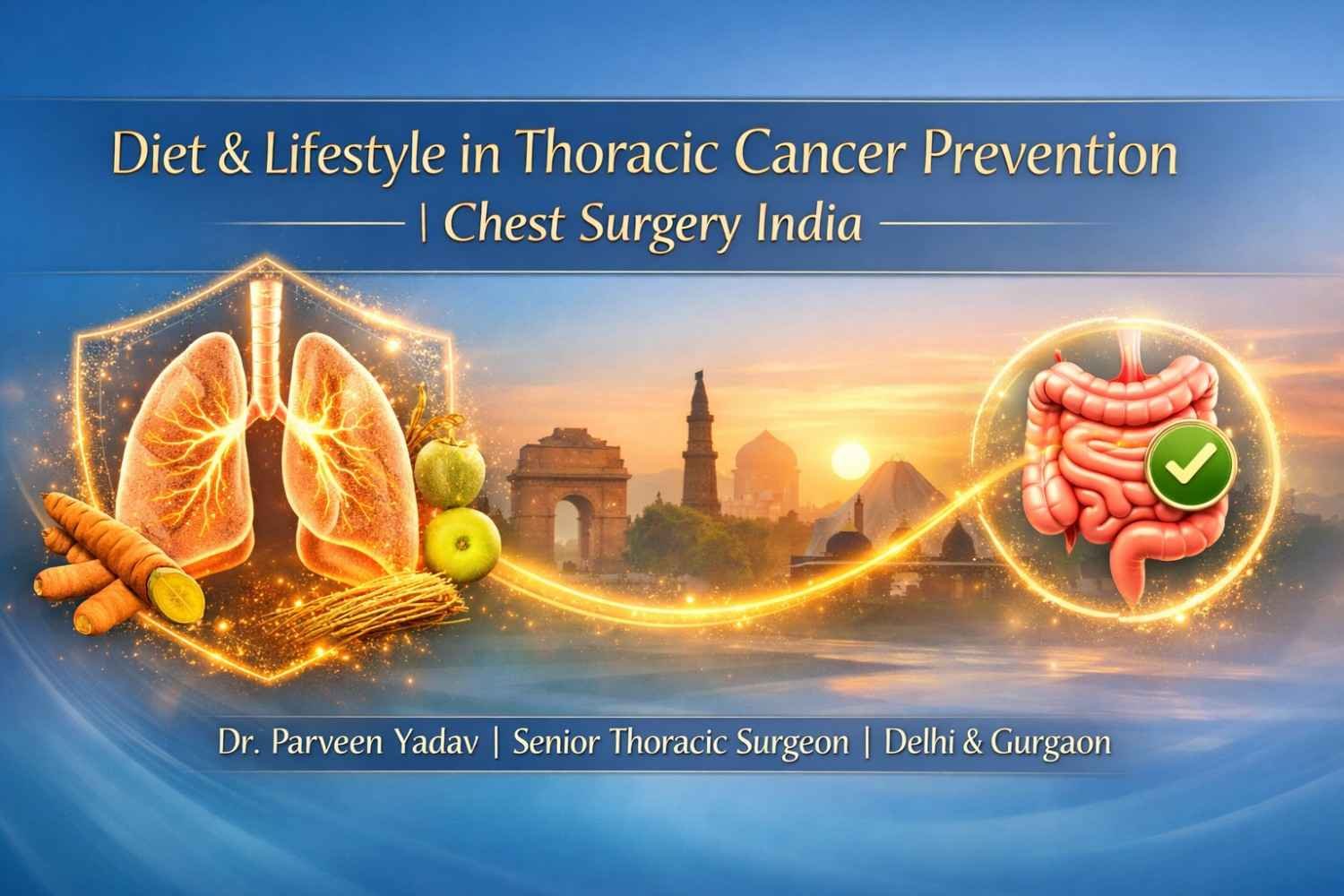

Lung cancer is one of the most catastrophic illnesses one can encounter. It is a cancer that develops in your lung tissue and may spread to nearby organs if not treated on time. Lung cancer can have life-threatening implications, making it important to take the issue seriously.
If you or anyone in your family experience symptoms that hint toward lung complications, make sure you seek the right medical help in your city. For example, if you live in Delhi, go to the best lung cancer specialist in Delhi for appropriate diagnosis and treatment.
Changing Your Lifestyle To Prevent Lung Cancer
Lung cancer is one of the most common cancer types in the world. Every year, more and more people fall prey to the disease due to unhealthy lifestyles. They often regret getting diagnosed with lung cancer, by which time it becomes too late to repent.
However, if you are still untouched by lung cancer, make sure you turn your life around and make some key changes therein to keep the health complication away.
Also Read: The Effectiveness Of Chemotherapy In Treating Lung Cancer
Here are a few ways in which changing your lifestyle can help you prevent lung cancer:
Stop Smoking
The single most important thing a person can do to prevent lung cancer is to quit smoking. Smoking is the leading cause of lung cancer, and it increases the risk of developing the disease by up to 15-30 times. Quitting smoking can significantly reduce the risk of developing lung cancer. Even if you have been smoking for many years, quitting can still be beneficial.
Avoid Secondhand Smoke
Secondhand smoke, also known as passive smoke, is the smoke that is exhaled by a smoker or comes from the burning end of a cigarette, cigar, or pipe. Exposure to secondhand smoke can also increase the risk of developing lung cancer. Avoiding secondhand smoke by not being around smokers or in places where smoking is allowed can help reduce the risk of developing lung cancer.
Reduce Exposure to Air Pollution
Air pollution does more damage to your lungs than you think. Even if you are a non-smoker, prolonged exposure to polluted air can lead to complications like lung cancer. Make sure you are conscious about the air you breathe to know what effect it has on your lungs.
Exposure to air pollution, such as diesel exhaust and other outdoor pollutants, can increase the risk of developing lung cancer. Reducing exposure to air pollution can be done by staying indoors when the air quality is poor, using air filters, and reducing the use of products that produce indoor air pollution.
Eat a Healthy Diet
A diet rich in fruits, vegetables, and whole grains may help reduce the risk of developing lung cancer. Eating a healthy diet can also help maintain a healthy weight, which is important for reducing the risk of many types of cancer.
Exercise Regularly
Regular physical activity can help maintain a healthy weight and reduce the risk of developing many types of cancer, including lung cancer. Aim for at least 30 minutes of moderate-intensity exercise most days of the week.
Get Screened
Finally, if you are at high risk of developing lung cancer, such as if you have a history of smoking or exposure to other risk factors, talk to your doctor about getting screened. Early detection of lung cancer can improve the chances of successful treatment.
How To Know You May Have Lung Cancer?
One of the biggest reasons why people are diagnosed with lung cancer when it is too late is because they ignore the symptoms. Most lung cancer symptoms are often confused with those arising due to flu, common cold, or ordinary cough.
However, it is never advisable to take these signs lightly. Here are the most common signs of lung cancer that should prompt you to seek immediate medical help:
Persistent Cough
A cough that lasts for more than two or three weeks is one of the most common symptoms of lung cancer. The cough may be dry or produce phlegm, and it may get worse over time.
Shortness of Breath
Shortness of breath or difficulty breathing is another common symptom of lung cancer. This may occur with or without physical activity, and it may be accompanied by a wheezing or a high-pitched sound when breathing.
Chest Pain
Chest pain is a common symptom of lung cancer, and it may be felt in the chest, back, or shoulders. The pain may be dull, sharp, or constant, and it may get worse with deep breathing or coughing.
Hoarseness In Voice
A hoarse or raspy voice that persists for more than two or three weeks may be a symptom of lung cancer. This may be caused by the tumor pressing on the vocal cords or other structures in the chest.
Unexplainable Weight Loss
Unexplained weight loss of more than 10 pounds may be a symptom of lung cancer. This may be caused by the cancer itself or by a lack of appetite due to other symptoms such as coughing and shortness of breath.
Fatigue
Feeling tired or weak all the time is another common symptom of lung cancer. This may be caused by the cancer itself or by other factors such as stress or lack of sleep.
Clubbing of Fingers
Clubbing of the fingers, where the nails curve around the fingertips, is a late-stage symptom of lung cancer. This is caused by a lack of oxygen in the blood and is a sign that the cancer has advanced.
If you have been experiencing any of these symptoms for too long and your doctor diagnoses you with cancer, make sure you opt for the best lung cancer treatment in Delhi to restore your health.
The Final Word
These are some major lifestyle changes that can help you stay away from lung cancer. Taking the right preventive measures and leading a healthy lifestyle is always better than repenting after getting diagnosed with cancer! Make sure you make these changes while you can and keep issues like lung cancer at bay.

18+ Yrs Exp | 5,700+ Thoracic & Robotic Cancer Surgeries
Dr. Parveen Yadav is a Director and Senior Consultant in Thoracic and Surgical Oncology, specializing in minimally invasive and robotic lung and esophageal surgeries, with advanced training from AIIMS and Tata Memorial Hospital.
View Full Profile Pain After Thoracic Surgery: Tips for Smooth Recovery
Pain After Thoracic Surgery: Tips for Smooth Recovery
 Diet & Lifestyle for Thoracic Cancer Prevention | Dr. Parveen Yadav
Diet & Lifestyle for Thoracic Cancer Prevention | Dr. Parveen Yadav
 Robotic Thoracic Surgery: How Da Vinci Technology is Revolutionizing Chest Procedures
Robotic Thoracic Surgery: How Da Vinci Technology is Revolutionizing Chest Procedures
Struggling with pain after chest surgery? Dr. Parveen Yadav shares expert recovery tips, causes of shoulder pain, PTPS signs, and what your discharge sheet won't tell you.
Discover how diet, breathing exercises & daily habits help prevent and recover from thoracic cancer. Expert insights from Dr. Parveen Yadav, Chest Surgery India
Discover how Da Vinci robotic surgery is transforming chest procedures in Gurgaon. Less pain, faster recovery & expert care by a certified thoracic surgeon
Copyright 2026 © Dr .Parveen Yadav all rights reserved.
Proudly Scaled by Public Media Solution!